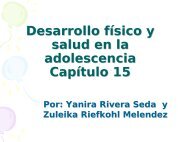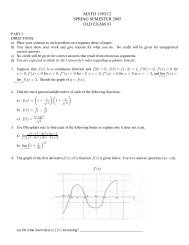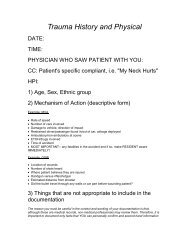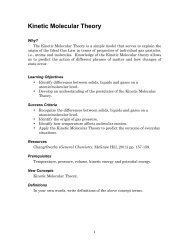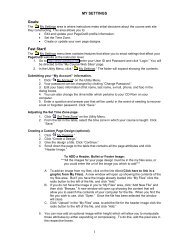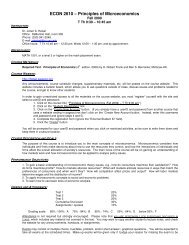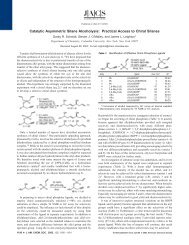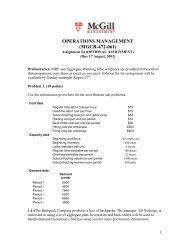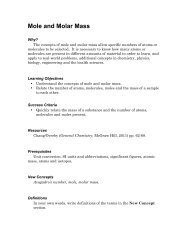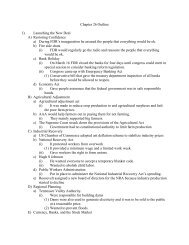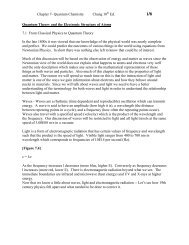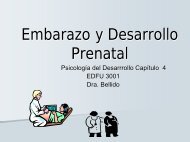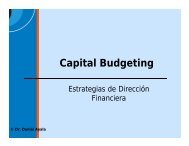Aristotle, "Metaphysics" Excerpts - PageOut
Aristotle, "Metaphysics" Excerpts - PageOut
Aristotle, "Metaphysics" Excerpts - PageOut
- No tags were found...
Create successful ePaper yourself
Turn your PDF publications into a flip-book with our unique Google optimized e-Paper software.
called Wisdom to deal with the first causes and the principles of things; so that, as has beensaid before, the man of experience is thought to be wiser than the possessors of any senseperceptionwhatever, the artist wiser than the men of experience, the masterworker than themechanic, and the theoretical kinds of knowledge to be more of the nature of Wisdom thanthe productive. Clearly then Wisdom is knowledge about certain principles and causes.Part 2Since we are seeking this knowledge, we must inquire of what kind are the causes and theprinciples, the knowledge of which is Wisdom. If one were to take the notions we haveabout the wise man, this might perhaps make the answer more evident. We suppose first,then, that the wise man knows all things, as far as possible, although he has not knowledgeof each of them in detail; secondly, that he who can learn things that are difficult, and noteasy for man to know, is wise (sense-perception is common to all, and therefore easy and nomark of Wisdom); again, that he who is more exact and more capable of teaching the causesis wiser, in every branch of knowledge; and that of the sciences, also, that which is desirableon its own account and for the sake of knowing it is more of the nature of Wisdom than thatwhich is desirable on account of its results, and the superior science is more of the nature ofWisdom than the ancillary; for the wise man must not be ordered but must order, and hemust not obey another, but the less wise must obey him.…Now of these characteristics that of knowing all things must belong to him who has in thehighest degree universal knowledge; for he knows in a sense all the instances that fall underthe universal. And these things, the most universal, are on the whole the hardest for men toknow; for they are farthest from the senses. And the most exact of the sciences are thosewhich deal most with first principles; for those which involve fewer principles are moreexact than those which involve additional principles, e.g. arithmetic than geometry. But thescience which investigates causes is also instructive, in a higher degree, for the people whoinstruct us are those who tell the causes of each thing. And understanding and knowledgepursued for their own sake are found most in the knowledge of that which is most knowable(for he who chooses to know for the sake of knowing will choose most readily that which ismost truly knowledge, and such is the knowledge of that which is most knowable); and thefirst principles and the causes are most knowable; for by reason of these, and from these, allother things come to be known, and not these by means of the things subordinate to them.And the science which knows to what end each thing must be done is the most authoritativeIn the variable are included both things made and things done; making and acting are different (for their naturewe treat even the discussions outside our school as reliable); so that the reasoned state of capacity to act isdifferent from the reasoned state of capacity to make. Hence too they are not included one in the other; forneither is acting making nor is making acting. Now since architecture is an art and is essentially a reasoned stateof capacity to make, and there is neither any art that is not such a state nor any such state that is not an art, artis identical with a state of capacity to make, involving a true course of reasoning. All art is concerned withcoming into being, i.e. with contriving and considering how something may come into being which is capableof either being or not being, and whose origin is in the maker and not in the thing made; for art is concernedneither with things that are, or come into being, by necessity, nor with things that do so in accordance withnature (since these have their origin in themselves). Making and acting being different, art must be a matter ofmaking, not of acting. And in a sense chance and art are concerned with the same objects; as Agathon says, 'artloves chance and chance loves art'. Art, then, as has been is a state concerned with making, involving a truecourse of reasoning, and lack of art on the contrary is a state concerned with making, involving a false courseof reasoning; both are concerned with the variable.3
of the sciences, and more authoritative than any ancillary science; and this end is the good ofthat thing, and in general the supreme good in the whole of nature. Judged by all the tests wehave mentioned, then, the name in question falls to the same science; this must be a sciencethat investigates the first principles and causes; for the good, i.e. the end, is one of thecauses.That it is not a science of production is clear even from the history of the earliestphilosophers. For it is owing to their wonder that men both now begin and at first began tophilosophize; they wondered originally at the obvious difficulties, then advanced little bylittle and stated difficulties about the greater matters, e.g. about the phenomena of the moonand those of the sun and of the stars, and about the genesis of the universe. And a man whois puzzled and wonders thinks himself ignorant (whence even the lover of myth is in a sensea lover of Wisdom, for the myth is composed of wonders); therefore since theyphilosophized order to escape from ignorance, evidently they were pursuing science in orderto know, and not for any utilitarian end. And this is confirmed by the facts; for it was whenalmost all the necessities of life and the things that make for comfort and recreation hadbeen secured, that such knowledge began to be sought. Evidently then we do not seek it forthe sake of any other advantage; but as the man is free, we say, who exists for his own sakeand not for another's, so we pursue this as the only free science, for it alone exists for itsown sake…Part 3Evidently we have to acquire knowledge of the original causes (for we say we know eachthing only when we think we recognize its first cause), and causes are spoken of in foursenses. In one of these we mean the substance, i.e. the essence (for the 'why' is reduciblefinally to the definition, and the ultimate 'why' is a cause and principle); in another the matteror substratum, in a third the source of the change, and in a fourth the cause opposed to this,the purpose and the good (for this is the end of all generation and change)…However true it may be that all generation and destruction proceed from some one or (forthat matter) from more elements, why does this happen and what is the cause? For at leastthe substratum itself does not make itself change; e.g. neither the wood nor the bronzecauses the change of either of them, nor does the wood manufacture a bed and the bronze astatue, but something else is the cause of the change. And to seek this is to seek the secondcause, as we should say,-that from which comes the beginning of the movement…Book VPart 2'Cause' means (1) that from which, as immanent material, a thing comes into being, e.g. thebronze is the cause of the statue and the silver of the saucer, and so are the classes whichinclude these. (2) The form or pattern, i.e. the definition of the essence, and the classeswhich include this (e.g. the ratio 2:1 and number in general are causes of the octave), and theparts included in the definition. (3) That from which the change or the resting from changefirst begins; e.g. the adviser is a cause of the action, and the father a cause of the child, and ingeneral the maker a cause of the thing made and the change-producing of the changing. (4)4
The end, i.e. that for the sake of which a thing is; e.g. health is the cause of walking. For'Why does one walk?' we say; 'that one may be healthy'; and in speaking thus we think wehave given the cause. The same is true of all the means that intervene before the end, whensomething else has put the process in motion, as e.g. thinning or purging or drugs orinstruments intervene before health is reached; for all these are for the sake of the end,though they differ from one another in that some are instruments and others are actions.These, then, are practically all the senses in which causes are spoken of, and as they arespoken of in several senses it follows both that there are several causes of the same thing,and in no accidental sense (e.g. both the art of sculpture and the bronze are causes of thestatue not in respect of anything else but qua statue; not, however, in the same way, but theone as matter and the other as source of the movement), and that things can be causes ofone another (e.g. exercise of good condition, and the latter of exercise; not, however, in thesame way, but the one as end and the other as source of movement).-Again, the same thingis the cause of contraries; for that which when present causes a particular thing, wesometimes charge, when absent, with the contrary, e.g. we impute the shipwreck to theabsence of the steersman, whose presence was the cause of safety; and both-the presenceand the privation-are causes as sources of movement.All the causes now mentioned fall under four senses which are the most obvious. For theletters are the cause of syllables, and the material is the cause of manufactured things, andfire and earth and all such things are the causes of bodies, and the parts are causes of thewhole, and the hypotheses are causes of the conclusion, in the sense that they are that out ofwhich these respectively are made; but of these some are cause as the substratum (e.g. theparts), others as the essence (the whole, the synthesis, and the form). The semen, thephysician, the adviser, and in general the agent, are all sources of change or of rest. Theremainder are causes as the end and the good of the other things; for that for the sake ofwhich other things are tends to be the best and the end of the other things; let us take it asmaking no difference whether we call it good or apparent good.5



